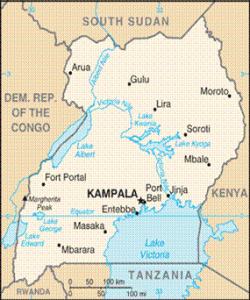
GEOGRAPHY
Uganda shares borders with Sudan to the north, Kenya to the east, Lake Victoria to the southeast, Tanzania and Rwanda to the south and the Democratic Republic of Congo to the west. Kampala is on the shores of Lake Victoria, and the White Nile flowing out of the lake traverses much of the country. The varied scenery includes tropical forest and tea plantations on the slopes of the snowcapped Ruwenzori Mountains, the arid plains of the Karamoja, the lush, heavily populated Buganda, the rolling Savannah of Acholi, Bunyoro, Tororo and Ankole, and the fertile cotton area of Teso.
HISTORY
Uganda achieved independence from the United Kingdom in 1962. The dictatorial regime of Idi AMIN (1971-79) was responsible for the

deaths of some 300,000 opponents; guerrilla war and human rights abuses under Milton OBOTE (1980-85) claimed at least another 100,000 lives.
During the 1990’s, the government promulgated non-party presidential and legislative elections.
THE PEOPLE
While the borders of Uganda are clearly fixed, the population actually consists of more than 30 ethnic groups. Moreover, several difficult religions are represented in Uganda making it a truly multi-ethnic, multi-religious country. Fortunately for the visitor, English is widely spoken and communication is not difficult. What awaits the traveler is a friendly, mostly good-humored people that are often curious to the visitor.
SOCIAL CONVENTIONS
Shaking hands is the normal form of greeting. Casual dress is usual for most occasions in the daytime or evening.
LANGUAGE
English is the official language, with Luganda and Swahili also widely spoken.
GOVERNMENT
The President of Uganda is both head of state and head of government. The president appoints a Prime Minister who aids him in his tasks. The parliament is formed by the National Assembly, which has 303 members, 86 of which are nominated by interest groups, including women and the Ugandan army. The remaining members are elected for five-year terms during general elections.
TIME ZONE
Local time is three hours ahead of Greenwich Mean Time. There is no daylight savings time in Uganda. Uganda is eight hours ahead of the eastern United States in winter and seven hours in the summer.
ELECTRICITY
Electricity is 240 volt, 50 cycles. Outlets may be two or three pronged. If you must bring electrical appliances, bring an adapter. These can also be purchased at hardware stores or borrowed at some hotels. Remote lodges and camps get their electricity from generators. Often the generators are only operated at specific times of day.
CLIMATE
Temperatures in some parts of the country can be quite cool owing to the country’s high altitude, despite its position on the Equator. The mountain areas become much cooler and the top of Mount Elgon is often snow-covered. Other parts of the country are much warmer. There is heavy rain between March and May and between October and November.
Clothes to Wear
Lightweights and rainwear, with warm wraps for the evenings are advised. Leather or climbing gloves are highly recommended for Gorilla Trekking to assist in making your way through the bush.
LOGISTICAL
Entry & Exit Requirements:
Entry into Uganda requires a passport valid for six months beyond the date of entry, a visa. Visas are available at Entebbe Airport upon arrival or may be obtained from the Embassy of the Republic of Uganda. The current fee for a three month tourist visa obtained upon arrival at Entebbe Airport is $50.00. Travelers should be aware that a visa does not determine how long a person may remain in Uganda. The Ugandan immigration officer at the port of entry will determine the length of authorized stay, which is generally from one to three months as a tourist. Extensions of duration of stay may be requested at Ugandan immigration headquarters on Jinja Road in Kampala. Airline companies may also require travelers have a visa before boarding.
Travelers should obtain the latest information and details from the Embassy of the Republic of Uganda at 5911 16th Street, N.W., Washington, D.C. 20011. Tel: (202) 726-7100. Overseas, inquiries may be made at the nearest Ugandan embassy or consulate. Visit the Embassy of Uganda’s website for the most current visa information.
U.S. citizens living or traveling in Uganda are encouraged to register with the nearest U.S. embassy or consulate at the Department of State’s travel registration page in order to obtain updated information on local travel and security. U.S. citizens without Internet access may register directly with the nearest U.S. embassy or consulate. Registration is important; it allows the State Department to assist U.S. citizens in an emergency.
Embassy and High Commission Locations:
Embassy of the United States of America
1577 Ggaba Road, Kampala
Tel: (256-41) 259 791
Fax: 256-414-258-451
http://kampala.usembassy.gov/
Canada High Commission
Jubilee Insurance Centre
14 Parliament Avenue
Kampala, Uganda
Tel: (256-41) 258-141
http://www.dfait-maeci.gc.ca/ nairobi/uganda_office-en.asp
HEALTH
Evidence of a yellow fever vaccination is required from travelers arriving from infected areas. Travelers arriving from non-endemic zones should note that vaccination is strongly recommended for travel outside the urban areas, even if an outbreak of the disease has not been reported and they would normally not require a vaccination certificate to enter the country.
Malaria is prevalent in Uganda. Travelers who become ill with a fever or flu-like illness while traveling in a malaria-risk area and up to one year after returning home should seek prompt medical attention and tell the physician their travel history and what anti-malarials they have been taking. For additional information on malaria, including protective measures, see the CDC Travelers’ Health website.
Evidence of a polio vaccination for children under five is required. Due to a polio outbreak, children under the age of five crossing from endemic neighboring countries such as Democratic Republic of Congo, Sudan and Kenya (as well as Nigeria, India and Pakistan where the disease is also prevalent), may be required to receive an oral polio drop vaccination upon entry if not already vaccinated.
Tuberculosis is an increasingly serious health concern in Uganda. For further information, please consult the CDC’s Travel Notice on TB.
Information on vaccinations and other health precautions, such as safe food and water precautions and insect bite protection, may be obtained from the Centers for Disease Control and Prevention’s (CDC) hotline for international travelers at 1-800-CDC-INFO (1-800-232-4636) or via the CDC website at http://wwwnc.cdc.gov/travel. For information about outbreaks of infectious diseases abroad, consult the infectious diseases section of the World Health Organization (WHO) website at http://www.who.int/topics/infectious_ diseases/en/. The WHO website also contains additional health information for travelers, including detailed country-specific health information.
Banks and Currency:
Uganda Shilling (UGX). Notes are in denominations of UGX50,000, 20,000, 10,000, 5,000 and 1,000. Coins are in denominations of UGX500, 200, 100, 50, 20, 10, 5, 2 and 1.
Foreign currency may be exchanged at the Central Bank, commercial banks and foreign exchange bureau. Note that only post year 2000 series US dollars are accepted in Uganda. Small notes obtain worse exchange rates than large bills. Payment for services by Visa or MasterCard can only be done in some places. Generally only large hotels generally accept this means of payment and they may also levy a fee of at least 5% on top of any bills.
Barclays Bank is the only bank and only the main branch in Kampala is authorized to give cash advances on credit cards. Visa cards are fine, however MasterCards are not guaranteed and will only be cashed if they clear certain internal security checks. The maximum that can be obtained is $400 per day and only during backing hours.
There are some ATM machines located in Entebbe Airport, Kampala and also in Mbarara. They pay local money only and travelers will need an international use PIN code to draw money. The maximum withdraw amount is UGX 2 million per day (about USD1,200 equivalent) but also depends on restrictions from the traveler’s own individual bank, so may well be less.
To avoid additional exchange rate charges, travelers are advised to take traveler’s checks in US Dollars. Travelers Checks however, generally cannot be cashed anywhere except in Kampala.
The import and export of local currency is prohibited. Free import and export of foreign currency must be declared on arrival. It is imperative to obtain a currency declaration form on arrival. Unspent shillings can be reconverted to foreign currency.
Banking Hours: 9am-3pm Monday to Friday, 9am-12pm Saturday.
Communication:
Telephone: IDD is available to and from principal towns in Uganda. Country code: 256. Outgoing international calls must go through the operator. Service for local calls is unreliable.
Mobile Telephone: GSM 900 network. Coverage extends to all major towns.
Fax: Service is available at the Postal & Telecommunications Office in Kampala; central post offices in Jinja and Mbale between 8am & 4pm; and in some hotels
Cell Phone Usage:
Please contact your cell phone provider to determine whether your contract includes coverage in the country you are visiting. Depending on your contract you may have to add international services and/or country specific services.
ENTERTAINMENT
Food & Drink:
There are restaurants in and around Kampala. Many hotels serve local food. Popular dishes include matoke (a staple made from bananas), millet bread, cassava, sweet potatoes, chicken and beef stews and freshwater fish.
The national drink is waragi, a banana gin, popular among visitors as a cocktail base.
Nightlife:
After a day of seeing the sights, take a short rest and get ready for a night on the town! Experience the culture in literally a different light, by joining the locals and other travelers at a dance club, musical show, pub or at a late night cafe.You’ll be energized by the city lights and excitement that happens as the day quickly fades to night.
Shopping:
Shopping in Uganda generally falls into two main categories. There are the supermarkets and larger ‘western’ style stores where a wide range of consumer goods is available, all the products have fixed prices and the layout has aisles and check outs.
These shops are frequented by foreigners and the more wealthy Ugandans. These shops are only found in Kampala and the other larger towns and cities.
Most shops are smaller family or community run businesses ranging from road side piles of goods, through small stalls through to small shop units with a counter but no aisles or checkouts. You will probably do much of your shopping in smaller shops where prices may be fixed or you may need to haggle. Markets are full of stalls selling everything from padlocks and towels to beef and bicycle tires.
Shopping hours: 8am-5pm Monday to Friday, 8am-1pm Saturday.
BAGGAGE
Baggage rules for international and domestic air travel have changed much in recent years, differ from carrier to carrier and these days even may cover your on-board bags. Checking luggage may cost a separate fee or may be free depending on your personal status with the carrier. We therefore encourage you to read your ticket’s small print and/or contact your carrier for exact rules.
TIPPING
It is customary to give waiters and taxi drivers a 10% tip.
LAUNDRY
Laundry service is available at most hotels in the main centers. Generally you should allow about 24-hours before the item is returned to you, however, some have an emergency service available at an extra charge.
PHOTOS & VIDEOS
In some countries you must refrain from photographing sites such as Military bases and industrial installations. Also be aware of cultural sensitivities when taking pictures of or near churches and other religious sites. It is always courteous to ask for permission before taking photographs of people.
USE OF DRONES
The use of drones is being legislated by many countries. In some cases drones are already forbidden and their unauthorized use may carry severe penalties. If you plan to travel with a drone please contact the embassy or consulate of the country you wish to visit.
![SITA Canada Final_color [Converted]new_for_wp SITA Canada Final_color [Converted]new_for_wp](https://sitatourscanada.com/wp-content/uploads/2019/12/SITA-Canada-Final_color-Convertednew_for_wp.png)
